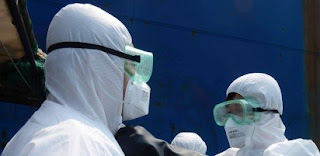A new safe test that detects Ebola within minutes could help doctors stop the spread of the deadly disease.
The device, which requires just a pinprick of blood, can be used at the bedside of patients and is as accurate as traditional lab tests that can take days.
A drop of blood is taken from a finger prick performed with a safety lancet, which has a spring-loaded mechanism that prevents health care workers from accidental stabbing themselves with the needle after the sample is taken.
It works similarly to a home pregnancy test, with the sample applied to a treated strip.
If the sample is positive for Ebola, a coloured line appears on the strip at a specific location.
It does away with the need to build biologically secure laboratories, the need to take large blood samples with needles and then transport them long distances which runs the risk of contaminating health workers.
And doctors can isolate infected patients more quickly, so reducing the risk of it spreading and starting treatments earlier so survival chances are improved.
A field trial of the test, developed by the US company Corgenix, took place at two treatment centres run by the Ministry of Health and Sanitation in Sierra Leone.
A total of 106 patients suspected of having Ebola were given the fingerprick test and also had their blood analysed the normal way.
Every case of Ebola confirmed in the laboratory using the standard procedure was detected by the bedside test, with very few non-infected people wrongly testing positive.
However both tests failed to pick up a small number of Ebola cases that were identified by an alternative ultra-sensitive lab test which is not widely available.
Dr Nira Pollock, from Boston Children’s Hospital in the US, who led a trial of the test reported in The Lancet medical journal, said: ‘Simplifying the process and speeding up diagnosis could have a major impact.’
The device was the ReEBOV Antigen Rapid Test developed by Corgenix.
The Public Health England lab at Port Loko in Sierra Leone, where clinical samples were routinely sent for standard molecular diagnostic testing, confirmed diagnosis.
Read More: Mail Online UK
(adsbygoogle = window.adsbygoogle || []).push({});


